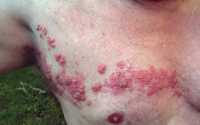MedicalResearch.com Interview with:
Kimberly D Tran, MD
Bascom Palmer Eye Institute
MedicalResearch.com: What is the background and purpose for this study?
Dr. Tran: Approximately 30% of the population will suffer from herpes zoster (also known as shingles) at some point in their lifetime, with an estimated 1 million cases in the U.S. each year (1). The most common long term complication of herpes zoster is postherpetic neuralgia (PHN), or persistent neuropathic pain lasting beyond three months after initial presentation of herpes zoster. PHN can negatively affect quality of life to a degree similar to congestive heart failure, depression, acute myocardial infarction,diabetes.
Postherpetic neuralgia is a leading cause of suicide in patients over 70 with chronic pain.(3,4) Of all the cases of herpes zoster, an estimated 10-20% will have herpes zoster ophthalmicus (HZO), which is defined as shingles in the area of the face near the eye, and sometimes the eye itself becomes involved. Approximately 50% of individuals with HZO will develop ocular complications without antiviral treatment, while antiviral induction within the first 72 hours of rash onset reduces this number to 20-30% (2). Randomized control trial has demonstrated the efficacy antiviral therapy in the treatment of herpes zoster on first presentation.(6) What is less understood is the course of HZ after its initial presentation. Traditionally studied and treated in the acute phase,(5-7) recent data suggest that some patients experience a chronic or recurrent disease course. Based on this data, it is clear that more information is needed on the long term clinical course of herpes zoster ophthalmicus. The purpose of this study was to characterize the epidemiology of recurrent and chronic HZO in a unique South Florida population, with an ethnically and racially mixed, predominately male population.
(more…)


